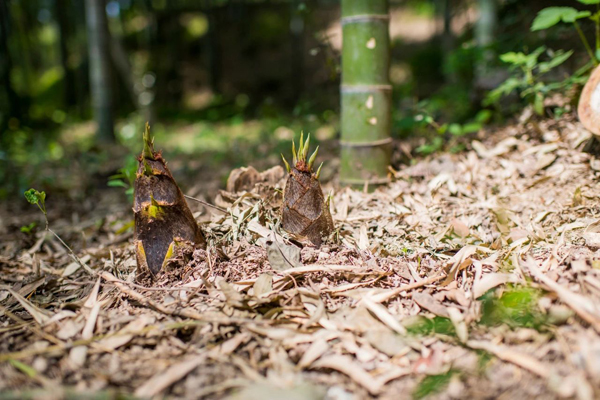As China's classic car rally enters its third year, pioneers of this subculture grapple with obstacles along the way, Li Fangfang reports
When describing the Classic Cars Challenge China, race organizer Xu Qun likens it to its venerable Italian counterpart the Mille Miglia, a 1,000 mile endurance race for owners of classic cars.
A two-time participant in the global Mille Miglia as a driver, Xu said he dreams that one day the various roadblocks to classic car ownership in the country will be overcome, and Chinese can drive their own cars the race.
Having a rally of local classic car enthusiasts is the first step, Xu said.
|
The Classic Cars Challenge China began on Oct 12 at the Great Wall in Beijing and ended on Oct 17 in Shanghai. Consisting of vintage domestic brands like Hongqi and Shanghai as well as classic foreign models, the fleet inspired great excitement among onlookers. Chen Ming / For China Daily |
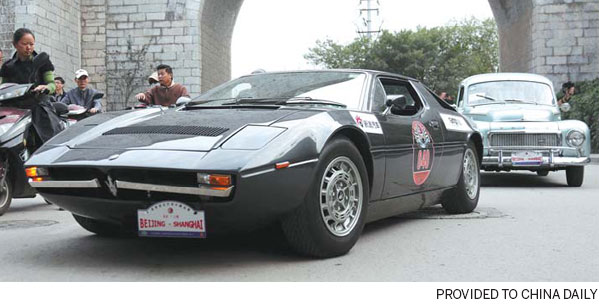
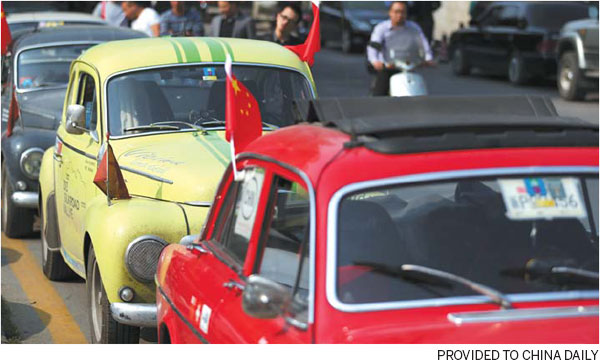
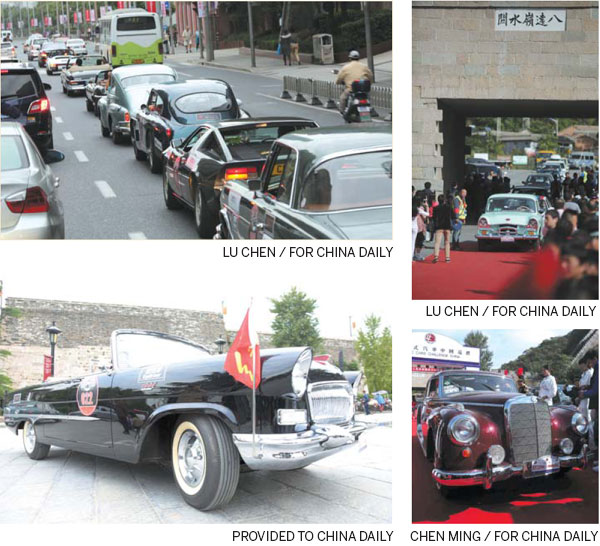
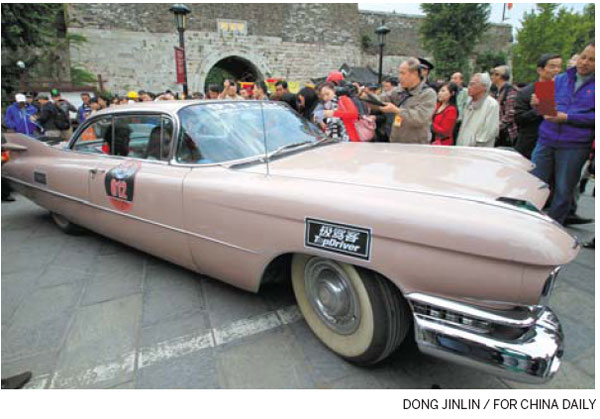
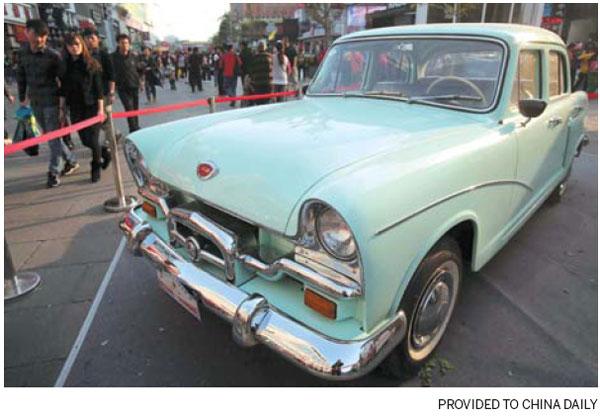
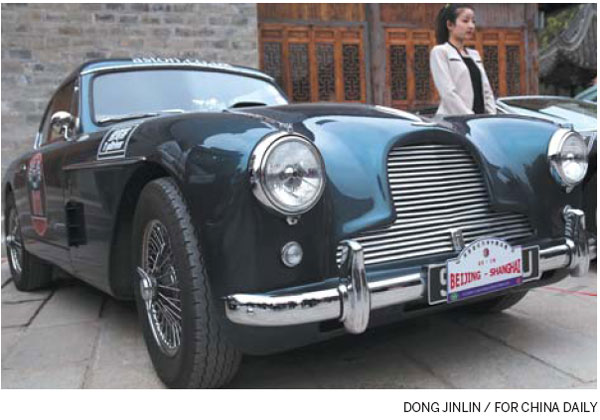
"Seeing China have its own Mille Miglia is a part of my dream. Classic cars are a very important step in terms of a country developing its own automobile culture," said Xu, publisher of Ramp magazine in China.
Xu also has a new title - vice-president of the Classic Vehicle Union of China.
As a fan of classic cars working to promote the subculture in the world's largest automobile market, Xu and his kindred spirits established the union as the only member of the Federation Internationale des Vehicules Anciens in China and held the country's first rally in 2011.
"Now, entering just the third year, I could drive my own vintage car throughout the rally both as a racer and an organizer," said Xu.
Xu bought his first classic car, a dark-green Mercedes-Benz 280SE last year, after the car finished its race in the challenge. This year, he drove the 1971 Mercedes to win second place in the rally, which started on Oct 12 at the Great Wall in Beijing and ended in Shanghai six days later.
More than 50 classic cars from 22 countries and regions around the world joined the 1,800-km challenge.
The list included China's iconic 1959 Hongqi and the 1976 Shanghai Phoenix 760a as well as eye-catching 1959 Cadillac Coup De Ville, a 1972 Volkswagen Beetle Theo Decker Kafer, 1955 Bentley S1 Flying Spur, and an Aston Martin DB2/4 Mark II.
A first-generation 1974 Volkswagen Scirocco won the championship.
Great passion
"I am glad to be in China following the rally for the second time, impressed by the great passion from the Chinese drivers and owners," said Horst Bruning, president of the Federation Internationale des Vehicules Anciens.
"They share the same passion and love for historical vehicles with like-minded people anywhere, and all wish to conserve classic cars and culture for future generations."
He also said that wherever the fleet arrived along the route, "people closed around, shouting, and took out their cameras and mobile phones, taking pictures non-stop".
Entering the third year, the challenge saw increasing attention from not only the public, but also automakers.
Volkswagen Group China brought four vintage cars under four brands to the challenge in China this year.
"It's important for an automaker to help keep the heritage alive," said Markus Nels, director of the Sports Car Project at Volkswagen Group China.
Moreover, "these vintage cars, some of which are more than half a century old, run as well as brand-new modern cars", he said.
Restriction in China
However, in China, old cars are allowed to run on open roads during special events only.
"It's a pity and not reasonable that vintage cars cannot apply for a license plate due to emissions and other technical standards," said Zong Gui'an, president of Classic Vehicle Union of China.
"The tight policy as well as a lack of professional techniques and know-how all block the further development of classic cars in China," he said.
Xu was one of the earliest advocates in China for the freedom of these historical cars.
"These steel machines were born for mobility, so that they should continue their lives on roads, not only be displayed, spiritless, in museums," Xu said.
His friend, a private entrepreneur surnamed Zhu, sighed sadly in agreement.
Zhu, a fan of vintage cars, bought a 1972 Hongqi 770 in 2010.
"I only drove it on roads three times during the annual rally in the past three years", he said.
"It's really a pity that I can only appreciate my Hongqi in the garage, wiping the dust off it," said Zhu. "But it's such a good car to drive that it won me the first prize in the challenge last year."
Despite the hurdles faced by owners of classic cars, Zhu bought his second vintage car, from the German high-performance auto tuning company Brabus GmbH.
"I will try to drive the new car for the challenge next year and maybe buy a third one," said Zhu.
Nels from Volkswagen said that in Germany, people call cars with more than 30 years of history "old-timers". And the government encourages vintage car preservation by imposing lower taxes than new cars.
"China produced the first generation of vehicles about 30 years before. Then the cars from that age could be called classic cars, like a made-in-China Audi 100 in this year's fleet," Nels said.
"We will see more Chinese vintage cars in the future as China's automobile market continues to grow.
"Therefore, preserving the vintage cars and having a classic car culture is so important for the largest automobile market in the world," he said.
Stefan Hosters, head of sales at Brabus, also said he is hoping to see regulations on vintage cars eased.
"If we want to understand modern society, we must know the ancient times. It is just a matter of preserving culture and history which is really important," Hosters said. "China preserves so many ancient buildings, then why not the historical vehicles?"
Niche market
Though China still has a long way to go before it has a mature classic car culture and market similar to that of Western countries, many industry players are spying business opportunities that are emerging along with the growing popularity of the rally.
Hosters brought one vintage car to the rally in 2012, and sold it after.
He took two historical cars to China this year and has already signed a contract for one.
"And another purpose is that we believe our new car sales are also directly linked," said the Brabus sales director.
The tuning company now provides service to its vintages cars in China, with its flagship store for contemporary cars in Beijing and technicians flying from its professional department Brabus Classic in Europe.
"For vintage car showrooms and official local businesses, we still have to wait and see the market, and it also depends on regulations on the legal side," said Hosters.
Chen Yudong, president of Bosch (China) Investment, told China Daily that even Uwe Raschke, a board member of Robert Bosch GmbH in Germany, has mentioned the increasing potential of the niche market.
"He asked me to pay attention to the trend and see if we can do something to help promote vintage car culture in China, such as providing parts and service for vintage cars, which certainly is important for Bosch," said Chen.
Chen said Bosch's automotive aftermarket division is currently offering these services in Germany and some other European markets.
"Seeing the potential for this segment in China, we are evaluating the possibilities to support repairing and maintaining vintage cars in the future depending on the local conditions," Chen said.
Contact the writer through lifangfang@chinadaily.com.cn


